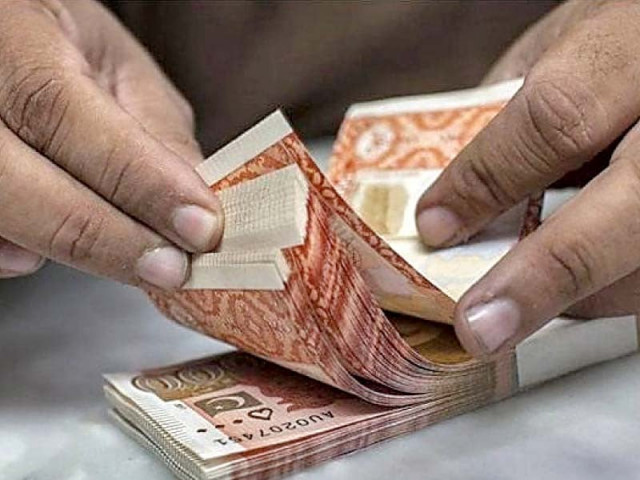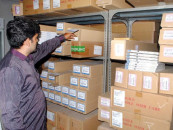Rupee springs surprise, drops Rs4
Difference between exchange rates in open, inter-bank markets widens to Rs6

Pakistani currency on Friday dropped by a surprising 1.40%, or Rs4, to Rs284 against the US dollar in the open market, doubling the difference between exchange rates in retail and inter-bank markets to over Rs6.
Market speculation suggests that the strengthening of illegal Hawala and Hundi network pulled the rupee down in both currency markets. Hawala and Hundi operators were paying Rs20-22 more for a dollar, which was sold for over Rs300/$ in the black market.
In the inter-bank market, the rupee shed 0.41%, or Rs1.13, to Rs277.59 against the greenback partially owing to the increase in demand for the greenback, ending three days of winning streak.
The significant depreciation in the open market encouraged the gold pricing body to jack up the precious metal’s price by Rs6,500 to Rs214,500 per tola (11.66 grams).
On the other hand, the foreign currency inflows from overseas Pakistanis through the Roshan Digital Account (RDA) remained thin at $127 million in June. This slowdown may further dampen sentiment in currency markets.
Talking to The Express Tribune, Exchange Companies Association of Pakistan (ECAP) General Secretary Zafar Paracha said people were mostly not coming to sell foreign currencies at retail counters because they may have got better exchange rates in the grey market.
“The supply of foreign currencies to dealers in the open market has slowed down to such an extent that they are unable to meet even muted demand from buyers,” he said, adding that the situation dragged the rupee down by Rs4 in retail trade.
Latest reports indicate that the Paris-based international financial transaction watchdog, the Financial Action Task Force (FATF), has once again raised alarm over the strengthening of illegal markets and suspicious transactions like money laundering. “FATF’s concerns signal the Hawala-Hundi network has re-established itself,” he said.
Earlier, the illegal market badly impacted the inflow of remittances from overseas Pakistanis, leading to a notable 14% decline to $27 billion in fiscal year 2022-23 compared to $31.3 billion in FY22.
Paracha pointed out that the demand and supply of dollars had remained muted in retail trade since the central bank allowed commercial banks to buy the greenback from the inter-bank market to settle the international payments made through credit cards by their clients.
Earlier, the banks used to purchase $10-20 million a day in the open market, which constituted almost 80% of the retail business.
He suggested that the government should cut its non-development expenditures to create fiscal space and let business generate economic activities. This will help strengthen the rupee in the long run.
“The central bank should soften rules and regulations for the open market so that currency dealers could survive the economic crisis.”
Gold shines
A member of the All Pakistan Saraf Gems and Jewellers Association (APSGJA), Abdullah Abdul Razzak, said the jolt to rupee-dollar parity caused the surge in gold prices in the local market while the commodity remained unchanged in the international arena. The bullion stood at $1,959 per ounce (31.10 grams) in the gobal market.
Gold has recovered by a cumulative Rs10,500 per tola in the past two days, reaching Rs214,500 on Friday.
Earlier, it hit a four-month low at Rs204,000 on Wednesday amid appreciation of the rupee post-new IMF loan programme of $3 billion and over capital inflows of $4.2 billion from the fund and friendly countries.
RDA inflows
The arrival of investments through the RDA remained low at $127 million in June 2023 compared to an all-time high of over $300 million reached in June 2021.
With the fresh arrival, the gross RDA inflows reached $6.35 billion by the end of June. The initiative was launched 34 months ago in September 2020.
Arif Habib Limited said in a brief commentary that out of the total funds, overseas Pakistanis withdrew $1.42 billion and spent another $3.77 billion in the national economy. Accordingly, the net repatriable liability stood at $1.12 billion.
He elaborated that out of the net liability, overseas Pakistanis invested a net $321 million in the Naya Pakistan Certificates (NPCs), $377 million in the Shariah-compliant NPC and $18 million in the Pakistan Stock Exchange. Other liabilities amounted to $20 million.
Published in The Express Tribune, July 15th, 2023.
Like Business on Facebook, follow @TribuneBiz on Twitter to stay informed and join in the conversation.



















COMMENTS
Comments are moderated and generally will be posted if they are on-topic and not abusive.
For more information, please see our Comments FAQ